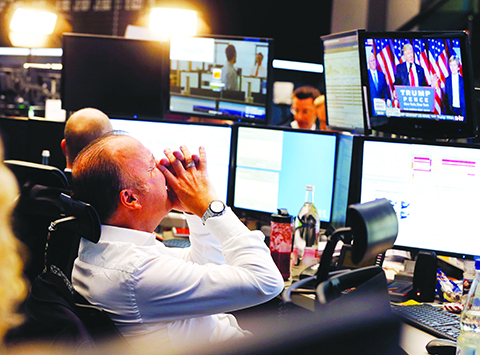 FILE - In this Wednesday, Nov. 9, 2016 file photo, a broker reacts as U.S. President-elect Donald Trump appears on a television screen at the stock market in Frankfurt, Germany. Though The US election was a key focus in financial markets in the final weeks of 2016, with stock markets in the US posting a series of highs since. -AP
FILE - In this Wednesday, Nov. 9, 2016 file photo, a broker reacts as U.S. President-elect Donald Trump appears on a television screen at the stock market in Frankfurt, Germany. Though The US election was a key focus in financial markets in the final weeks of 2016, with stock markets in the US posting a series of highs since. -AP LONDON: 2016 was the year when globalization, the path that the world economy has largely followed for decades, took some hefty blows. The election of Donald Trump as US president and Britain's decision to leave the European Union have raised questions over the future of tariff-free trade and companies' freedom to move production to lower-cost countries. Borders are back in vogue.
Economic nationalism is paying political dividends. "We want our country back" was the rallying cry of those backing Brexit. A sound bite that had echoes in Trump's "Make America great again." Next year, there's scope for more uncertainty with elections in France and Germany to name just two. Trump and Brexit were just two of the year's top stories in the world of business.
Brexit shock
In what was a sign of things to come, Britain voted to leave the EU in a referendum in June. The decision came as a surprise - certainly to bookmakers and many pollsters who had consistently given the "remain" side the edge - and means Britain has to redefine itself after 43 years of EU membership.
Prime Minister David Cameron has resigned and the new government led by Theresa May is planning to trigger the formal process by which the country exits early next year. There are many shades of potential Brexit, from an outright divorce that could put up tariffs on goods and services, to a more amicable parting that sees many of the current trading arrangements kept in place. The pound's fall to a 31-year low below $1.20 at one point is testament to that uncertainty.
Trump card
Pollsters and bookmakers got it wrong again a few months later when Trump defeated Hillary Clinton in the presidential election. Whether he translates his "America First" platform into action following his inauguration in January will help shape the global economy for the next four years at least. Trump has railed against long-standing trading agreements, including the North American Free Trade Agreement, punish China for the way it devalues its currency against the dollar, and tax US firms that move jobs overseas.
Markets march on
Trump's victory did not cause the bottom to fall out of the stock market rally that's been largely in place since 2009, when the world economy started to first claw out of its deepest recession since World War II. In fact, both the Dow and the S&P 500 rallied to hit a series of record highs.
Stocks have also benefited from a raft of big corporate deals this year - executives are seeing takeovers as a fast way to generate growth in what is otherwise a low-growth global economy disrupted by non-stop technological innovations. Notable deals in 2016 included the announcement of an $85 billion merger of Time Warner and AT&T and the $57 billion takeover of Monsanto by Germany medicine and farm-chemical maker Bayer. The $100 billion takeover of SABMiller by Budweiser maker Anheuser-Busch InBev was also completed.
China's key role
As the world's second-largest economy, China is playing a bigger role in the functioning of the global economy. Nowhere was that more evident than in the early months of 2016, when jitters over the scale of the slowdown in China caused wild swings in financial markets. Stocks took a pounding while commodities tanked, with oil skidding to 13-year lows, as traders factored in lower demand from resource-hungry China.
The slump in commodities weighed heavily on economies like Australia that are big exporters of raw materials. China's economy is ending the year in relatively good health as authorities try to pivot the economy's focus from manufacturing to more consumer spending. But Trump's promises to take a tough stance in trade will be focusing minds in Beijing.
OPEC takes a stand
For the first time since Dec 2008, at the height of the financial crisis, the Organization of Petroleum Exporting Countries cut its production levels. November's cut, soon followed by non-OPEC countries like Russia, helped push oil prices sharply higher. At over $50 a barrel, benchmark New York crude is markedly higher than the near 13-year lows around $30 recorded at the start of the year, when investors focused on high supply and concerns over an economic slowdown.
The oil slump helped put several crude-producing countries into severe recessions, including Brazil and Venezuela, and even saw wealthy Saudi Arabia cut back on spending. The question for 2017 is whether OPEC - and non-OPEC - countries can deliver on their production promises. If they do and higher oil prices stick, that will push up inflation in the global economy. - AP










